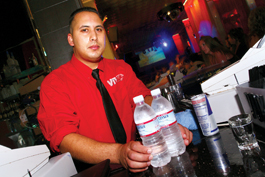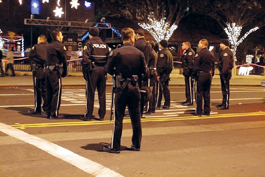home | metro silicon valley index | news | silicon valley | news article

Photographs by Felipe Buitrago
Watered down: 'Big B' Barry tends bar at Vivid on Saturday, during the first weekend of San Jose's
'soft-closing' policy, which allows venues to stay open for one additional hour, alcohol-free.
Going Soft
Sizing up downtown San Jose's first weekend in the 'soft closing' experiment
By Mike Connor
THIS past weekend, a smattering of bars, clubs and restaurants in downtown San Jose took part in the new "soft closing" pilot program, which is basically just a complicated way of saying that some businesses can stay open an hour later for 90 days, after which the program will be reassessed. Under the new plan, booze still stops at 1:30am, but the bars can stay open for another full hour, which club owners, police, elected officials and clubbers hope will give people a chance to sober up a bit and leave downtown in a gradual trickle, rather than the deluge of patrons who are herded out by police in what has become a much-resented weekend-night ritual.
According to the San Jose Downtown Association, the point of the pilot project is to improve the late-night downtown experience while reducing the number of overtime police officers needed at closing time.
"The whole point of this," says Sgt. Nick Muyo from the SJPD press info office, "is if you have, say, 5,000 people in the entertainment zone in a given evening, the goal is to move half at 2am and half at 3am ... people who have had too much to drink, who want to fight, who want to get behind the wheel of a car; it becomes more of a manageable group."
Mission Ale House owner Dan Doherty says they just hoped to achieve "a less frantic, abrasive feeling of 'You have to get out of here,' so they can kind of leave in a less stressful environment."
As of presstime on Monday, neither the downtown association nor Muyo had much of anything to say about how things actually went during the inaugural weekend, but Muyo says that's a good thing.
"I didn't get called once," says Muyo, who was on call this weekend, "and there was nothing in the bulletin to indicate there was anything out of the ordinary."
Councilmember Sam Liccardo says pushing the inaugural weekend back from its original date undoubtedly helped.
"We delayed it for a week," says Liccardo, "because some club owners said they haven't had enough time to get things going ... I heard from three people that said things went OK. From what I can tell, it operated pretty much along with our expectations—a minimal amount of hassles, people were leaving the club as we'd expect, but really what makes a difference is the club owners stepping up and taking responsibility."
Doherty says most of the customers were unaware of the change, but were pleasantly surprised by the invitation to stick around and have some appetizers.
"We did well enough that we would just keep doing it," says Doherty, "people definitely enjoyed it."
Almost sounds like common sense itself rearing its unremarkable head in the wild and volatile world of downtown nightlife. According to Liccardo, some of the club owners will be volunteering their sales data to the City Council in order to help them evaluate the success or failure of the program. Police will track incident reports and compare them with past figures. Pretty much everyone else will decide for themselves based on their own experiences.

In the zone: The downtown community sees soft closings as a way to ease back on heavy late-night police presence in the entertainment zone, such as the officers pictured here last New Year's Eve.
Scoping the Scene
Armed with a bloodstream full of performance-enhancing drugs (caffeine, guarana, B vitamins and Tequila do the trick quite legally), I set out Friday night to witness the soft closing, starting at Caravan, which didn't actually participate in the program, but there's no cover charge and the drinks are fairly priced. At around 1am, pairs of police officers wormed their way through the crowd inside and five police cars were parked outside, which my wife and I took as our cue to move on.
More police cars, a fire truck and an ambulance camped outside of Smoke Tiki Lounge. Apparently someone tripped and fell inside, judging by the neck brace and battered-about-the-face look on the guy who was wheeled out on a stretcher. Conveniently, my wife discovered that the SJFD provides free bandages for blistered heels, so we kept moving. One police car studded the middle of the road outside of Vault. Nobody else seemed to mind the $20 cover charge, as the club was packed.
During the dreaded 1:30–2am period when the exodus usually happens, I loitered outside of San Jose Bar & Grill and Tres Gringos to see what happened—not a whole lot. Cops hung back across the street, but only engaged an angry young couple yelling at each other. A huge neon sign inside SJ Bar & Grill advertised its late-night offerings, but after 1:30am, there was no line, and the place pretty much cleared out by 2am. There was a small crowd of people loitering out front, shuffling around a bit aimlessly, seeming half-stunned by the fact that they weren't being ousted by the cops.
Doherty calls the soft closing "pretty uneventful."
"We operated like we normally do and did our closing the exact same way," says Doherty, "and from there we let people leave in a much more laid-back environment."
The DTA's Rick Jensen says the owners of Mission Ale House, Vault, Vivid and San Jose Bar & Grill also reported an uneventful exit, with the last stragglers leaving well before 3am.
"It may be conditioning, it may be something else," says Jensen. "Pretty much the attitude that it was not a big deal and things went smoothly."
Send a letter to the editor about this story.
|
|
|
|
|
|